|
|
|
Sort Order |
|
|
|
Items / Page
|
|
|
|
|
|
|
| Srl | Item |
| 1 |
ID:
133369
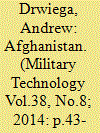

|
|
|
|
|
| Publication |
2014.
|
| Summary/Abstract |
A complete analysis of ISAF's combat commitment within Afghanistan is impossible to summaries in a single article; but, by focusing on specific campaign factors, some lessons for the future can be discerned while a little more time remains with boots on the ground.
|
|
|
|
|
|
|
|
|
|
|
|
|
|
|
|
| 2 |
ID:
131794
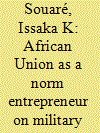

|
|
|
|
|
| Publication |
2014.
|
| Summary/Abstract |
Between 1952 and 2012, there were a total of 88 successful military coups in Africa. Of those, 63 occurred prior to 1990, and 10 cases since the adoption, by the defunct Organization of African Unity (OAU), of the Lomé Declaration in July 2000, banning military coups and adopting sanctions against regimes born out of this. The article shows that the African Union (AU) has followed in the footsteps of the OAU in this regard. Assisted by some African regional organisations and international partners, the combined effect of this policy of the AU - assisted by other factors - has been a significant reduction in the occurrence of this phenomenon. While not constituting a funeral arrangement for military coups in the immediate future, these developments - if they were to continue - may indeed make this eventuality achievable in the long run. But the article also reveals some challenges the AU is facing in ensuring this.
|
|
|
|
|
|
|
|
|
|
|
|
|
|
|
|
| 3 |
ID:
132417
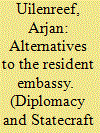

|
|
|
|
|
| Publication |
2014.
|
| Summary/Abstract |
Increasingly integrated in a common political entity, the European Union's member states are exploring new avenues to shape and maintain their mutual relations. This analysis describes three alternatives to the traditional resident embassy by which ministries of foreign affairs within the EU attempt to maintain diplomatic networks. The models discussed are secondments within member states' capitals, visiting ambassadors, and co-location and co-operation. In other words, with regard to different modes of representation, member states can consider diving in, stepping back, or pooling and sharing. These developments shed light on the ways in which the diplomatic machineries of the member states are trying to adapt to the demands of a "post-Westphalian" environment such as that of the EU.
|
|
|
|
|
|
|
|
|
|
|
|
|
|
|
|
| 4 |
ID:
131029
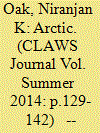

|
|
|
|
|
| Publication |
2014.
|
| Summary/Abstract |
Regionalism as a political project has been a signi?cant phenomenon in post-1945 international relations. The third phase of regional integration began towards the end of the 19805 within the international context created by the end of the Cold War. Academics dubbed it as "new regionalism".' Most of the regional organisations that came up in those days were based on economic cooperation among the states. It was an era of globalisation. The Arctic Council (AC) which emerged in 1996 was a unique case. The 'Arctic' has emerged as a region in international cooperation during the past 20-30 years, as manifest in the creation of the AC. The objective of the AC was sustainable development and environmental protection only, and that is why it may be termed as a unique case in that period.
|
|
|
|
|
|
|
|
|
|
|
|
|
|
|
|
| 5 |
ID:
130996
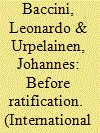

|
|
|
|
|
| Publication |
2014.
|
| Summary/Abstract |
When do international treaties cause domestic policy adjustments? While previous research emphasizes the consequences of treaty ratification, we argue that the need to secure entry into force can induce states to change their policies already before ratification. If a state expects benefits from a treaty, it can increase the probability of foreign ratification by implementing policies that benefit pivotal domestic players within its partner country. Accordingly, studies that focus on policy change after ratification underestimate the importance of treaties and partly misconstrue the causal connection between treaties and policies. We test the theory against data on the relationship between North-South preferential trading agreements (PTAs) and automobile emission standards, finding that developing countries adopt automobile emission standards between the signature and ratification of North-South PTAs.
|
|
|
|
|
|
|
|
|
|
|
|
|
|
|
|
| 6 |
ID:
131065
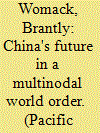

|
|
|
|
|
| Publication |
2014.
|
| Summary/Abstract |
Over the next twenty years China is likely to become the world's largest national economy, though not the richest one-fifth of the world's population. Chinese demographic power will be qualitatively different from American technological power despite bottom-line similarities in GNP, and China will face challenges of political and economic sustainability. Assuming that globalization, constrained state sovereignty, and demographic revolution continue as basic world trends, the world order is likely to be one in which concerns about conflicts of interests drive interactions, but no state or group of states is capable of benefitting from unilaterally enforcing its will against the rest. Thus, there is no set of "poles" whose competition or cooperation determines the world order, despite the differences of exposure created by disparities in capacity. Although the United States and China will be the primary state actors and their relationship will contain elements of rivalry as well as cooperation, the prerequisites of Cold War bipolarity no longer exist. Rather, the order would be best described as "multinodal," a matrix of interacting, unequal units that pursue their own interests within a stable array of national units and an increasing routinization of international regimes and interpenetrating transnational connections
|
|
|
|
|
|
|
|
|
|
|
|
|
|
|
|
| 7 |
ID:
131031
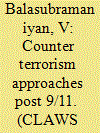

|
|
|
|
|
| Publication |
2014.
|
| Summary/Abstract |
Most studies on terrorism and political violence by experts and researchers have focussed on the causation factors of terrorism over the years. A majority of the scholarly works has mostly focussed on the historical, ideological, and etiological aspects of terrorism and insurgency. Scholars, researchers and investigators have attempted to epitomise and de?ne terrorism as a phenomenon, and have admitted to the problems in ?nding a universally acceptable de?nition. They have primarily focussed on bringing out an acceptable definition of terrorism in all its manifestations and forms, and in the process, have analysed the roots, origins and growth of terrorism. Compared to the enormous literature on the growth and incline of terrorism the world over, studies or scholarly works on the decline of terrorism or insurgency are not as vast and are limited in number.' A few experts like Martha Crenshaw and Audrey Cronin have dealt with this aspect in detail.' However, these attempts comprise only a fragment of the total terrorism literature in place.
|
|
|
|
|
|
|
|
|
|
|
|
|
|
|
|
| 8 |
ID:
129670
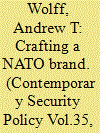

|
|
|
|
|
| Publication |
2014.
|
| Summary/Abstract |
NATO confronts four distinct public perception challenges: weak or varying public support for the alliance and its specific missions; a general lack of public awareness of the alliance's post-cold war transformation; diverging opinions on its proper role in the world; and parochial and domestic interests filtering into NATO's agenda. These various public relations challenges detract from alliance cohesiveness, impede mission performance, breed confusion and dissension about alliance aims, and raise questions about the proper operation of democratic governance within the alliance. Recent alliance communication efforts encompassing public diplomacy and strategic communications have failed to improve these public perception challenges. Instead, NATO should consider adopting a long-term branding strategy that focuses specifically on shaping the public's mental image of the alliance through the creation, promulgation, and management of a core message. Such a strategy has the potential to create a more consolidated alliance mandate that is easier for the public to understand and, ultimately, transforms the way NATO relates to its public.
|
|
|
|
|
|
|
|
|
|
|
|
|
|
|
|
| 9 |
ID:
132020
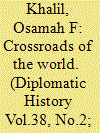

|
|
|
|
|
| Publication |
2014.
|
| Summary/Abstract |
In this paper, I argue that the "Middle East" is an ideational construct maintained by geographical, intellectual, and ideological representations. I assert that the geographical boundaries of the area called the Middle East have shifted over the past century to reflect the strategic interests of the major hegemonic power in the region, initially Britain and later the United States. Drawing on published and archival sources, I trace the etymology of the "Middle East" and its accompanying geographical representations and their relationship to key American and British foreign policy decisions and declarations. I also discuss how the Arabic translation of the "Middle East," or al-Sharq al-Awsa?, has been adopted and contested by scholars and journalists in the region.
|
|
|
|
|
|
|
|
|
|
|
|
|
|
|
|
| 10 |
ID:
131018
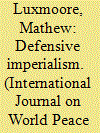

|
|
|
|
|
| Publication |
2014.
|
| Summary/Abstract |
This article examines Russia's approach to the post-Soviet space in relation to domestic stability during
I'utin's first two terms. It identi?es three dimensions of security which underpinned foreign policy during
this period-ideological, economic, and mi1itary~and demonstrates how each interacted with policies on the domestic front. Assessing Rnssia's response to Ukraine's Orange Revolution, it shows how the events of 2004 initiated a shift towards insulation from perceived external threats to political stability. A policy of "defensive imperialism" emerged whereby offensive actions abroad were aimed fundamentally at facilitating a stable external environment to politically safeguard the regime. The article concludes with a brief assessment of developments since 2008, and offers a pessimistic prognosis of the impact this trend will have on Russia's domestic stability and its international relations.
|
|
|
|
|
|
|
|
|
|
|
|
|
|
|
|
| 11 |
ID:
130999
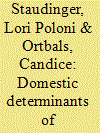

|
|
|
|
|
| Publication |
2014.
|
| Summary/Abstract |
We examine the degree to which national political setting, namely domestic political opportunity structures, influences the transnational activities of women's groups in the United Kingdom, France, and Germany. The literature suggests that social groups are more likely to choose international activity when national institutions provide fewer opportunities for domestic activity (Keck and Sikkink 1998; della Porta and Tarrow 2005). Using data about women's groups' activity from a content analysis of news wires from 1980 to 2008, we conclude that women's groups act in the domestic sphere significantly more than they act in the international arena-even when acting on transnational issues-and that groups choose international action when domestic opportunities are less hospitable to group action. Thus, we argue that the domestic sphere continues to be a major influence on social movement activity even as globalization and transnationalism increase.
|
|
|
|
|
|
|
|
|
|
|
|
|
|
|
|
| 12 |
ID:
131014
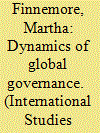

|
|
|
|
|
| Publication |
2014.
|
| Summary/Abstract |
It is hard to quarrel with Weiss and Wilkinson's argument that deeper investigation of global governance could have big payoffs, and the four "primary pursuits" or research tasks they sketch will interest many scholars in this field. My concern is that while Weiss and Wilkinson nicely describe the importance of these tasks, they offer only cursory suggestions about ways forward when they could do much more. Unlike Weiss and Wilkinson (hereafter W&W), I see a great deal of first rate work being done that speaks directly to issues they raise-how power is exercised globally,2 structures of global authority,3 increasing complexity,4 actor proliferation, and change. The problem, I would argue, is not that scholars are ignoring these issues, but that so much more could and should be done. In this short essay, I build on foundations laid by others to sketch more focused research agendas for global governance scholars in four areas to tackle some of the central questions W&W identify, with particular attention to their laudable interest in change.
|
|
|
|
|
|
|
|
|
|
|
|
|
|
|
|
| 13 |
ID:
130942
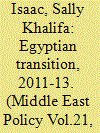

|
|
|
|
|
| Publication |
2014.
|
| Summary/Abstract |
This paper tackles the political and security complications of the Egyptian transition from its inception in January 2011 until the fall of the Muslim Brotherhood president, Mohamed Morsi, in July 2013, with a primary focus on how these complications are of strategic importance to Europe. It starts with inferring Egypt's role in European Union (EU) approaches to security in the Mediterranean, which were acknowledged in the 2003 European Security Strategy and then largely interpreted in the 2004 European Neighborhood Policy. It argues that the old EU democracy-stability dilemma persisted in Europe's approach to the Egyptian transition, especially during Morsi's one-year presidency. In discussing the current political and security complications of the Egyptian transition and how they constitute strategic concerns to Europe, the analysis tackles undermined social cohesion in Egypt due to processes of repolarization in Egyptian society after July 2013; the question of Egypt's porous borders with the Hamas-controlled Gaza Strip; the emergence of the Sinai Peninsula as a jihadist center; and the rising importance of economics in the EU-Egyptian relationship
|
|
|
|
|
|
|
|
|
|
|
|
|
|
|
|
| 14 |
ID:
130940
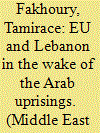

|
|
|
|
|
| Publication |
2014.
|
| Summary/Abstract |
Lebanon is a multisectarian state in which Muslim and Christian groups share political power. The executive elite is composed of a Maronite president, a Shiite speaker of parliament and a Sunni prime minister. The legislature is split 50-50 between Muslims and Christians, and communities enjoy educational and religious autonomy. Two pacts act as regulatory frameworks for these political arrangements: the 1943 National Pact and the 1989 Taif agreement, which put a halt to Lebanon's 15-year civil war (1975-90).
While Lebanon's prewar political system (1943-75) was often framed as a paradigmatic case of consociational or power-sharing democracy,1 most observers today agree that this system is an anarchistic model for the devolution of power. 2 Sectarian3 politics feeds on patronage ties and foreign alliances through which communities vie for control over resources. It further reifies partisanship in external conflicts.
|
|
|
|
|
|
|
|
|
|
|
|
|
|
|
|
| 15 |
ID:
130939
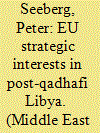

|
|
|
|
|
| Publication |
2014.
|
| Summary/Abstract |
Since the fall of Muammar Qadhafi in 2011, a legitimate monopoly over the means of violence has not been in the hands of the Libyan state. The military confrontation between the regime and what the international media called the "rebels," supported by the NATO no-fly zone, ended in October 2011. However, in 2012 and especially in 2013, Libya witnessed an escalating conflict pitting the democratically elected government and the Libyan state against armed groups and militias. For the EU, this is a challenge to its strategic interests, primarily security in the Mediterranean and secondarily migration and the development of Libya.
|
|
|
|
|
|
|
|
|
|
|
|
|
|
|
|
| 16 |
ID:
132329
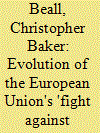

|
|
|
|
|
| Publication |
2014.
|
| Summary/Abstract |
The purpose of this article is to explore the ways in which the European Union (EU)'s counter-terrorism discourse, the 'fight against terrorism', is constructed, and the ways in which it functions both rhetorically and in practice. It argues that 'EU identity' is constituted through and is central to the constitution of EU counter-terrorism policy. The approach taken is constructivist in nature, drawing on a discourse analysis of primarily European Council policy documents, as well as the reports and speeches of the EU Counter-Terrorism Co-ordinator. In particular, it identifies three strands of the discourse that, it is argued, play a key role in the construction of a terrorist 'other'. These three strands include terrorism as crime and as an emotive act of violence; terrorism as an act perpetrated solely by non-state actors; and terrorism as a 'new' and 'evolving' threat. The article proceeds in three steps. First, it outlines the theoretical considerations that underpin this research, including its empirical application. Second, it demonstrates how each strand of the discourse is constructed. Third, it discusses the functioning of the discourse, including the contested nature of the 'terrorism knowledge' that underpins the EU's counter-terrorism approach. The article concludes by reflecting on what this case study contributes to our understanding of EU counter-terrorism policy, as well as explaining how the notion of the terrorist 'other' could provide the basis for a future research agenda that deepens our understanding of how the identity of the EU is constituted.
|
|
|
|
|
|
|
|
|
|
|
|
|
|
|
|
| 17 |
ID:
132021
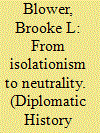

|
|
|
|
|
| Publication |
2014.
|
| Summary/Abstract |
This essay assesses the pitfalls of relying on isolationism to describe American political culture during the 1920s and 1930s and proposes that the concept of neutrality offers a more useful framework for understanding how Americans struggled with their place in a world at war. Americans had long worried about foreign entanglements, but what lent the debates after World War I their special urgency and potency was a sense that one important option in the traditional conduct of international relations-neutrality-had become unhinged from its moorings. Understanding the shifting meanings, and ultimately the perceived demise of neutrality as a viable form of statecraft, points toward a new way to narrate the turning points and political alliances of the interwar years. It also helps to explain why, since the 1930s, Americans have become more readily embroiled in military conflicts overseas despite their recurring doubts about the price of such engagement.
|
|
|
|
|
|
|
|
|
|
|
|
|
|
|
|
| 18 |
ID:
131012
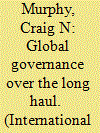

|
|
|
|
|
| Publication |
2014.
|
| Summary/Abstract |
WILKINSON and Weiss (W&W) suggest that questions surrounding global governance-"what makes the world hang together," to follow Ruggie (1998)-should become a central problematique for social scientists and historians studying the relations among the largest human communities in any era and therefore a central matter of interest for International Relations (IR). W&W argue that we should pursue this interest by (i) investigating the different forms of world organization across historical epochs; (ii) identifying and explaining both the largest structures of authority in any epoch as well as their interaction with more local systems; (iii) focusing our attention on power, interests, and on ideas-both those through which actors of a particular epoch come to understand their interests and those that reinforce, perhaps legitimately, the systems of authority of the day; and (iv) searching for ways to account for change both within and between epochs
|
|
|
|
|
|
|
|
|
|
|
|
|
|
|
|
| 19 |
ID:
133280
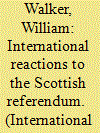

|
|
|
|
|
| Publication |
2014.
|
| Summary/Abstract |
The referendum on whether Scotland should become an independent country will be held on 18 September 2014. This article reflects on the evolution of foreign governments' attitudes towards the referendum since its confirmation in October 2012, and on their expectations should a 'yes' vote result. With few exceptions, they have adopted a policy of non-intervention, treating the referendum as the UK's domestic affair. President Obama's expression on 5 June 2014 of his desire for the UK to remain 'a strong, robust, united and effective partner' may, however, be seen as a sign of increasing apprehension abroad. Concerns of foreign governments aroused by the referendum include the diminution of the UK's power and role in international affairs, the possible encouragement of other secessionist movements, and disturbance to international organizations and alliances. It is commonly assumed that Scotland would become a reasonably prosperous and reliable small state. But how would the rest of the UK (rUK), a much more powerful and populous country, respond to 'the loss of Scotland'? How would it affect the UK's already unsettled relations with the EU, including the prospect of a referendum on EU membership? Despite many uncertainties and a febrile political atmosphere, it is widely expected abroad that Scotland and rUK would settle into a cooperative relationship after a difficult transitional period, and that an independent Scotland would be accepted into the EU and NATO if it displayed flexibility on important issues.
|
|
|
|
|
|
|
|
|
|
|
|
|
|
|
|
| 20 |
ID:
133625
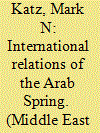

|
|
|
|
|
| Publication |
2014.
|
| Summary/Abstract |
Revolution does not just change things inside one country. It can disrupt international relationships throughout an entire region or even the world. What impact have the "Arab Spring" revolutions had on the international relations of the countries experiencing them, the Middle East, and the world? Have these upheavals been as disruptive of international relations as other revolutions? It will be argued here that, unlike what would occur if revolution succeeded in Syria or Bahrain, the Arab Spring revolutions that have succeeded in Tunisia, Egypt, Libya and Yemen have had a remarkably nondisruptive impact on international relations. To understand just how remarkable this is, though, something needs to be said about just how much revolution has disrupted international relations in the past.
|
|
|
|
|
|
|
|
|
|
|
|
|
|
|
|
|
|
|
|
|